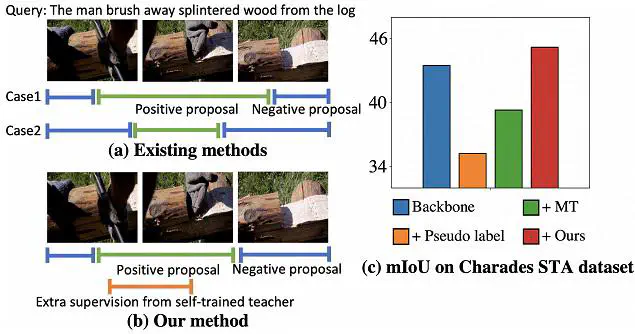
Abstract
The task of weakly supervised temporal sentence grounding aims at finding the corresponding temporal moments of a language description in the video, given video-language correspondence only at video-level. Most existing works select mismatched video-language pairs as negative samples and train the model to generate better positive proposals that are distinct from the negative ones. However, due to the complex temporal structure of videos, proposals distinct from the negative ones may correspond to several video segments but not necessarily the correct ground truth. To alleviate this problem, we propose an uncertainty-guided self-training technique to provide extra self-supervision signals to guide the weakly-supervised learning. The self-training process is based on teacher-student mutual learning with weak-strong augmentation, which enables the teacher network to generate relatively more reliable outputs compared to the student network, so that the student network can learn from the teacher’s output. Since directly applying existing self-training methods in this task easily causes error accumulation, we specifically design two techniques in our self-training method: (1) we construct a Bayesian teacher network, leveraging its uncertainty as a weight to suppress the noisy teacher supervisory signals; (2) we leverage the cycle consistency brought by temporal data augmentation to perform mutual learning between the two networks. Experiments demonstrate our method’s superiority on Charades-STA and ActivityNet Captions datasets. We also show in the experiment that our self-training method can be applied to improve the performance of multiple backbone methods.